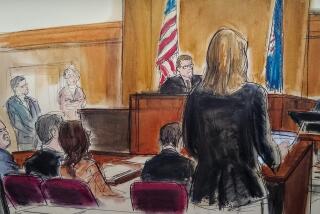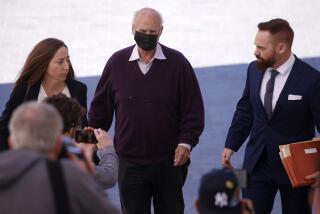Legal dilemma: The lawyer of their choice
Federal law allows the government to seize the ill-gotten gains of convicted drug dealers and other criminals, which is fair enough. But the law also permits prosecutors to freeze allegedly tainted assets of defendants who haven’t yet been tried, in some cases making it impossible for them to afford the lawyer of their choice.
On Wednesday, the Supreme Court will be asked to require additional judicial review of such seizures. It should do so, despite exaggerated claims by the Obama administration that new protections would undermine the criminal justice system.
The case was brought by Kerri Kaley, a sales representative for a subsidiary of Johnson & Johnson, and her husband, Brian, who were indicted on charges that they participated in a scheme to sell medical devices stolen from hospitals on the black market. The indictment was later broadened to include money laundering. The couple had hoped to pay their private lawyer out of personal resources, including a certificate of deposit they purchased using a home-equity line of credit. But the court froze many of their assets, concluding that those resources were connected to the couple’s alleged wrongdoing.
The Kaleys are asking the Supreme Court to rule that defendants may contest the seizure of their assets before trial not just on the grounds that the funds are unrelated to the alleged crime but also that the indictment itself is flawed. In the Kaleys’ case, they wanted to contest the indictment by arguing that the hospitals had no use for the devices and thus they weren’t stolen. The prosecution of the couple is on hold as the courts consider their challenge.
The Kaleys argue that the federal appeals court that upheld the seizure of their assets allowed a grand jury’s “untested finding of ‘probable cause’ to financially handicap a criminal defendant’s ability to mount a defense to the charges that threaten the defendant’s liberty. That harsh result cannot be correct.”
The government counters that if a grand jury indictment is sufficient to justify putting a suspect in jail before the trial is held, it’s also grounds for restricting a defendant’s access to financial resources. But pretrial detention by definition is temporary; eventually a defendant will have his day in court. The problem with freezing a defendant’s assets before trial is that it often prevents him from being represented by a lawyer of his choice. Its negative effect is thus permanent.
As the American Bar Assn. points out in a brief supporting the Kaleys, the Supreme Court has held that the 6th Amendment guarantees more than representation by a lawyer. In the words of Justice Antonin Scalia in a 2006 decision, it also means that the accused must be “defended by the counsel he believes to be best.” It isn’t too much to ask that a judge take a hard look at an indictment before depriving a defendant of that right.
More to Read
A cure for the common opinion
Get thought-provoking perspectives with our weekly newsletter.
You may occasionally receive promotional content from the Los Angeles Times.






